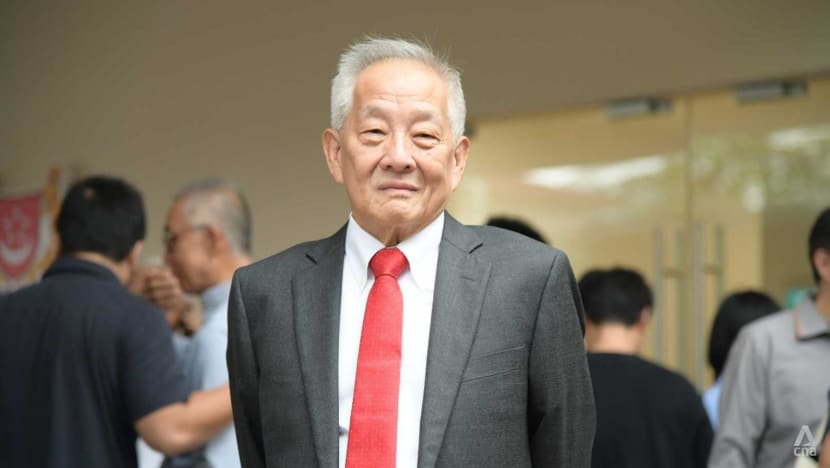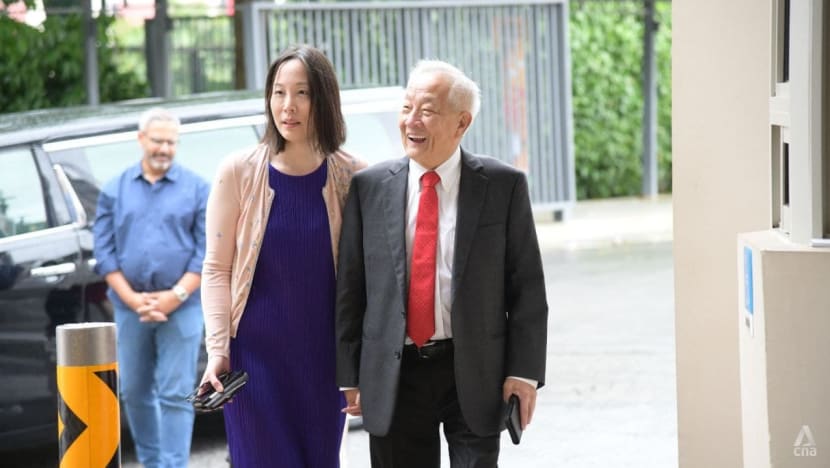Ng Kok Song's presidency eligibility depends on his GIC role, interpretation of Constitution: Lawyers
The Presidential Election Committee may consider the magnitude and complexity of Mr Ng Kok Song’s past responsibilities as chief investment officer of GIC.

Ng Kok Song at the Elections Department in Singapore on Jul 19, 2023. (Photo: CNA/Raydza Rahman)
SINGAPORE: Ex-GIC chief investment officer Ng Kok Song has thrown his hat into the ring as a presidential candidate, but whether he qualifies depends on the scope of his responsibilities in his former role and how the Constitution is interpreted.
The third candidate to announce his bid for the presidency, Mr Ng, 75, told reporters on Wednesday (Jul 19) that his application will be based on his work as chief investment officer at GIC, Singapore's sovereign wealth fund, for six years until he retired in 2013.
Mr Ng started his public service career as an investment analyst in the Ministry of Finance before moving to manage Singapore's reserves in the Monetary Authority of Singapore when it was formed in 1971.
Mr Ng joined GIC in 1986 for 27 years before retiring, and is now the executive chairman of Avanda Investment Management, an asset management company he co-founded in 2015 with two former GIC colleagues.
Under public sector requirements, presidential candidates must have held office for at least three years as a minister, chief justice, Speaker of the House, attorney-general, chairman of the Public Service Commission, auditor‑general, accountant‑general or permanent secretary.
They also qualify if they were chief executives - or the most senior executives, however named - in Fifth Schedule entities, namely key statutory boards and government companies such as the Central Provident Fund Board, Temasek and GIC - and served for at least three years.
Mr Ng's role as chief investment officer does not automatically fall under these requirements.
His application will fall under the public sector "deliberative track". This track is for those who claim to have experience and ability comparable to that of those who automatically qualify, and can effectively carry out the functions and duties of the President, said Singapore Management University's (SMU) Benjamin Joshua Ong.
"It’s called 'deliberative' because the Presidential Election Committee (PEC) has to exercise its discretion in deciding these matters," said the assistant professor at the Yong Pung How School of Law.
Asked about his eligibility on Wednesday, Mr Ng's team also cited the public sector deliberative track. Under Article 19(3)(c)(ii) of the Constitution, "the Presidential Elections Committee may consider the public service requirement to be met if the candidate has the experience and ability comparable to, inter alia, the CEO of a Fifth Schedule entity”, Mr Ng's spokesperson said.
INTERPRETATION OF CONSTITUTION
Mr Ben Chester Cheong from the Singapore University of Social Sciences (SUSS) was of the opinion that Mr Ng's eligibility depended on how strict an interpretation the PEC takes of the Constitution.
"If it adopts a narrow approach to the interpretation of Article 19(3)(c)(ii), then it is quite clear that a chief investment officer is not the most senior executive, however named, of a Fifth Schedule statutory board or government company."
On the other hand, if an "extremely wide interpretation" is adopted, the fixed list of public sector positions might be rendered pointless, said Mr Cheong, who is a lecturer at the SUSS' School of Law.
In the 2017 Presidential Election, the committee decided that Mr Mohamed Salleh Marican and Mr Farid Khan Kaim Khan did not qualify under the private sector deliberative track. Both candidates ran companies that fell short of the S$500 million (US$378 million) shareholder equity requirement.
This indicates that the PEC took a "strict interpretation of the S$500 million shareholder equity requirement" for the private sector deliberative track, said Mr Cheong.
"Hence, one could expect them to do the same when interpreting the scope of the public sector deliberative track requirements."
National University of Singapore (NUS) law professor Thio Li-Ann cited financial competence and political independence as key factors in considering a candidate's eligibility.
The relevant Articles in the Constitution indicate that the PEC should not take a "literalist approach", such as only considering people from the listed public sector offices, but should also consider those with comparable experience and ability, said Prof Thio.
Otherwise, this would be contrary to the "intent and spirit" of the constitutional provisions of the Elected Presidency scheme, she said.
She noted that a chief investment officer, or someone who has experience managing private sector companies with sizeable assets, will have greater financial literacy or competence than some of the roles that automatically qualified, such as the Speaker of the House or the Chief Justice.

MAGNITUDE, COMPLEXITY OF GIC ROLE
Asked about the factors the PEC might consider, SMU's Asst Prof Ong said these may include the precise leadership functions Mr Ng had, the length of his experience and the complexity of the matters he oversaw.
"It is also worth noting that the 'chief executive' of GIC automatically qualifies (as his role is listed in the Fifth Schedule), so the PEC might consider the magnitude and complexity of Mr Ng’s responsibilities as chief investment officer compared to those of the chief executive officer."
Apart from his experience in managing large sums of financial resources, the PEC could assess Mr Ng's ability in making judicious decisions and serving as a representative of Singapore on the local and international stage.
Mr Cheong concurred that Mr Ng could be compared to a chief executive or the most senior executive of a Fifth Schedule statutory board or government company.
"In that case, factors that would matter would include profit and loss responsibility, decision-making responsibilities, managing overall operations and setting the direction of the company. That individual must be accountable to the board of directors or stakeholders of the company and should be the public face of the organisation.
"From what I understand, chief investment officers are in charge of preserving a company's asset portfolios. They generally supervise a team of qualified professionals and help develop both short and long-term investment plans, recommend investments, and assign assets."
Performing well in this function could mean that Mr Ng possesses the capability to oversee one of the functions of the elected presidency, which is to safeguard Singapore's past reserves, noted Mr Cheong.
Prof Thio said the PEC should consider factors such as the candidate's job scope, seniority, management complexity and performance as identified in Article 19(4)(ii) to ascertain whether the candidate has "experience and ability".
"It should, in an age of good governance and transparency, provide sufficiently detailed reasons for its decision-making process and reasoning, rather than bland unilluminating statements to the effect that Candidate X meets or does not meet the requirements."
CAN HE RUN UNDER THE PRIVATE SECTOR DELIBERATIVE TRACK?
According to a Bloomberg report last year, government-linked firms Singapore Labour Foundation, Temasek and GIC contributed around US$4 billion in assets to help launch Avanda. The report added that Avanda's assets have since more than doubled to about US$10 billion.
Media reports stated that Avanda had an average of S$73 million in shareholder equity in the last three years, far lower than the minimum S$500 million in shareholder equity requirement.
SUSS' Mr Cheong said that going by the 2017 Presidential Elections, the requirement of S$500 million in shareholder equity appeared to be a "hard rule", so it may be difficult for Mr Ng to qualify under the private sector requirements.
Asked why Mr Ng did not choose to go under the private sector deliberative track, Asst Prof Ong said he could not speculate.
"It simply depends on the precise nature and scope of his role at Avanda and whether it is equivalent to that of 'chief executive'. We do not know enough about his precise job scope to say for sure."
Noting that there were others who held the title of co-chief executive officers, according to Avanda's website, Asst Prof Ong suggested that Mr Ng's role as chairman may not be comparable to "chief executive".
It is also possible that Mr Ng simply wanted to be best known for his public sector experience, the assistant professor said.


















